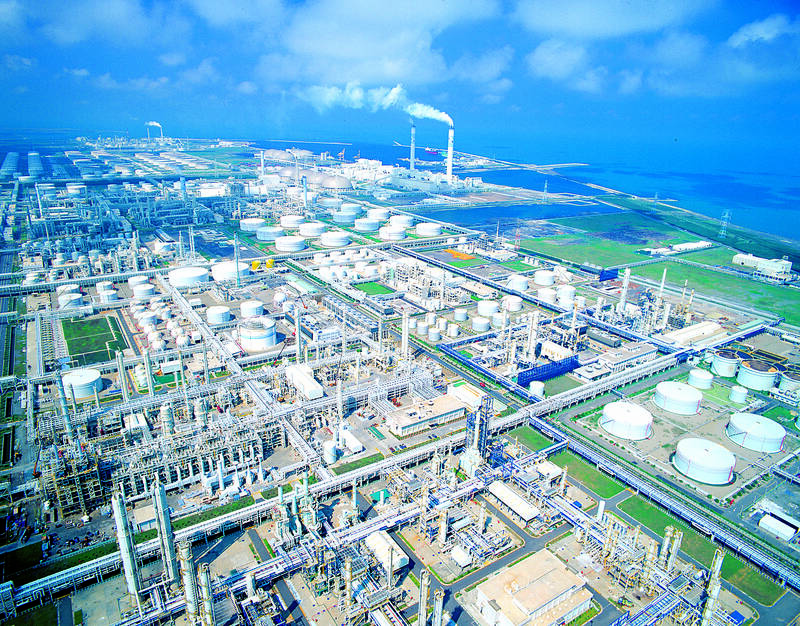Formosa Plastics Group (台塑集團), Taiwan’s largest industrial conglomerate, yesterday posted a small profit for its major four units of NT$715 million (US$21.69 million) for the fourth quarter and NT$8.37 billion for last year, it said, blaming languid demand and China’s overproduction.
The fourth-quarter results represented a comeback from losses of NT$8.03 billion in the preceding quarter, but suggested an 81 percent plunge, or earnings of NT$0.29 per share, compared with a year earlier, company data showed.
The poor earnings came even though combined revenues last year slipped only 2.1 percent to NT$1.47 trillion amid lingering excessive supply induced by Chinese peers, the group said.

Photo: Chang Huei-wen, Taipei Times
Consequently, the group said it would issue moderate year-end bonuses equivalent to three months of wages for its employees later this month.
The conglomerate said it is looking at business improvement this year for petrochemical products, but voiced concern that US president-elect Donald Trump’s planned tariff hikes would slow the pace of recovery.
Formosa Petrochemical Corp (台塑石化), engaged primarily in the business of refining crude oil, selling refined petroleum products and producing and selling olefins from its naphtha-cracking operations, last quarter emerged from losses by posting a profit of NT$1.27 billion, helped by inventory recovery, indirect investment and foreign exchange benefits, the company said in a stock exchange filing.
Similar reasons enabled the unit to book NT$5.944 billion of net income for the whole of last year, or earnings of NT$0.62 per share, it said.
Nan Ya Plastics Corp (南亞塑膠), whose main business involves producing processed plastic and chemical products, electronic materials and polyester fiber, last quarter saw its profit surge more than threefold to NT$280 million, as demand for most products picked up, it said.
Further, the company indirectly benefited from materials used in the development of artificial intelligence, it said.
For the whole of last year, Nan Ya reported a net income of NT$3.32 billion, or earnings of NT$0.42 per share, as the negative impact of global inflation and monetary tightening lessened, giving its customers renewed interest in rebuilding their inventories, it said.
However, the figures indicated a 47.4 percent retreat from a year earlier.
Formosa Chemicals and Fibre Corp (台灣化學纖維), which produces and sells petrochemical products, nylon fibers and rayon staple fibers in Taiwan and abroad, booked losses of NT$1.07 billion for the fourth quarter of last year, dragged by the falling international oil price and a supply glut, it said.
The subsidiary managed a tiny profit of NT$379 million for last year, or earnings of NT$0.06 per share, it said.
The company said it would seek to diversify its markets beyond China and focus on products that generate higher margins.
Formosa Plastics Corp (台灣塑膠), a vertically integrated supplier of plastic resins and petrochemicals, climbed out of the woods in the foruth quarter with a net income of NT$234 million, but swung to a loss of NT$1.27 billion, or NT$0.2 per share, last year, its filing said.
Core businesses continued to take losses and an investment in Fxuin Special Steel Co (福欣特殊鋼), a Chinese company based in China’s Fujian Province, also proved ill-fated, muting an increase in overall sales, it said.

Intel Corp chief executive officer Lip-Bu Tan (陳立武) is expected to meet with Taiwanese suppliers next month in conjunction with the opening of the Computex Taipei trade show, supply chain sources said on Monday. The visit, the first for Tan to Taiwan since assuming his new post last month, would be aimed at enhancing Intel’s ties with suppliers in Taiwan as he attempts to help turn around the struggling US chipmaker, the sources said. Tan is to hold a banquet to celebrate Intel’s 40-year presence in Taiwan before Computex opens on May 20 and invite dozens of Taiwanese suppliers to exchange views

Application-specific integrated circuit designer Faraday Technology Corp (智原) yesterday said that although revenue this quarter would decline 30 percent from last quarter, it retained its full-year forecast of revenue growth of 100 percent. The company attributed the quarterly drop to a slowdown in customers’ production of chips using Faraday’s advanced packaging technology. The company is still confident about its revenue growth this year, given its strong “design-win” — or the projects it won to help customers design their chips, Faraday president Steve Wang (王國雍) told an online earnings conference. “The design-win this year is better than we expected. We believe we will win

Chizuko Kimura has become the first female sushi chef in the world to win a Michelin star, fulfilling a promise she made to her dying husband to continue his legacy. The 54-year-old Japanese chef regained the Michelin star her late husband, Shunei Kimura, won three years ago for their Sushi Shunei restaurant in Paris. For Shunei Kimura, the star was a dream come true. However, the joy was short-lived. He died from cancer just three months later in June 2022. He was 65. The following year, the restaurant in the heart of Montmartre lost its star rating. Chizuko Kimura insisted that the new star is still down

While China’s leaders use their economic and political might to fight US President Donald Trump’s trade war “to the end,” its army of social media soldiers are embarking on a more humorous campaign online. Trump’s tariff blitz has seen Washington and Beijing impose eye-watering duties on imports from the other, fanning a standoff between the economic superpowers that has sparked global recession fears and sent markets into a tailspin. Trump says his policy is a response to years of being “ripped off” by other countries and aims to bring manufacturing to the US, forcing companies to employ US workers. However, China’s online warriors